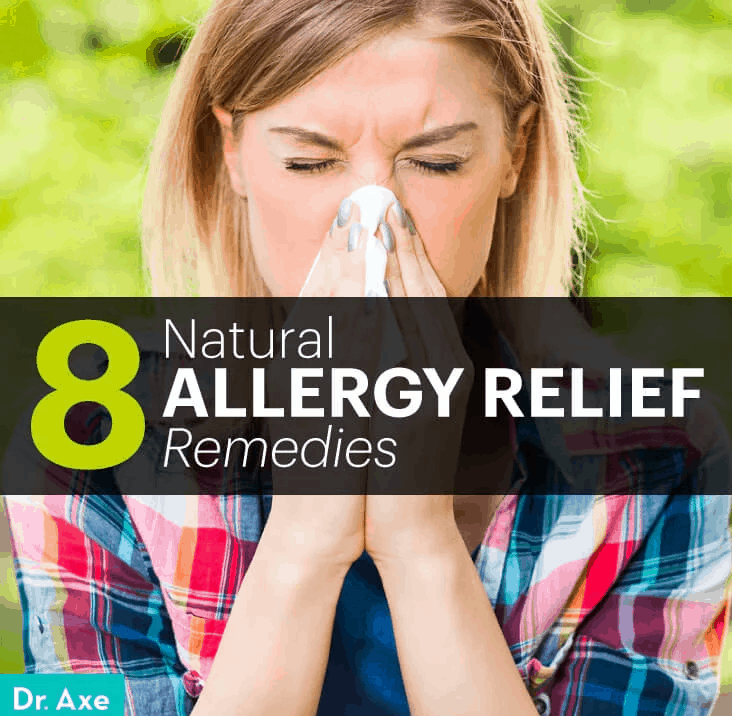
According to the Allergy and Asthma Foundation of America, 1 in 5 people, or an estimated 50 million Americans, suffer from some type of allergies. (1) The chances are high that you or someone you know suffers from allergies, whether seasonal allergies, food allergies or another type . Most people who are struggling with an allergy go to the doctor to be treated and are routinely given pharmaceuticals from acetaminophens to antihistamines, both of which may actually further aggravate the allergy symptoms they were given for. (2)
Is it that time of the year again? Time for congested sinuses, headaches, watery or itchy eyes and other signs of allergies? Before you know it allergy season will be upon us again, which means that millions of Americans are going to turn to Benadryl, Claritin and other medications to try and find some relief.
The good news is that you might not necessarily need to take any medications to control your allergy symptoms. There are many natural allergy relief remedies you can try first, such as using frankincense essential oil, eucalyptus oil and quercetin can help control your symptoms. Below you’ll learn about eight amazing, all-natural home remedies for allergies that can help provide fast relief.
Types of Allergies & the Most Common Symptoms
Allergies are a type of “bodily reactivity (hypersensitivity) to an antigen in response to a first exposure,” or an “exaggerated or pathological immunological reactions (as by sneezing, difficult breathing, itching, or skin rashes) to substances, situations, or physical states.” (3)
In other words, allergies are due to hypersensitivity of the immune system that causes damaging responses that can affect the whole body. Some of the most common causes of allergies? Things like pollen found outdoors, animal fur, dust or particular foods.
Allergy symptoms occur when your body responds to allergens by producing a chemical called histamine, which works by helping to counteract the allergen. The immune system causes allergic reactions by producing Immunoglobulin E (IgE) antibodies that cause widespread symptoms. There are several broad categories of allergies, which include: (4)
- Seasonal allergies (also called rhinitis or hay fever), usually worsening when pollen levels increase or change, such as during the Spring or Fall
- Perennial allergies, occurring year-round
- Food allergies, such as shellfish allergies
- Drug/medication allergies
- Indoor allergies, such as to mold or dust
- Skin or eye allergies
- Pet/animal allergies, such as to dogs/cats, insects, etc.
- Anaphylaxis, which is a serious, life-threatening allergic reaction in response to a number of different allergens
Symptoms caused by allergies vary from person to person, depend on what’s causing the allergic reaction, and will vary depending on how severe the allergy is. Common symptoms associated with allergies can include:
- Skin rash, redness, hives, dryness, peeling or itchiness
- Tingling or itchy sensations in the mouth and on the lips
- Swelling of the tongue, lip, throat or face
- Itchy nose, congestion and stuffiness
- Nausea and vomiting
- Diarrhea and abdominal cramps
- Coughing, wheezing and trouble breathing (symptoms of asthma that can sometimes be triggered by allergies)
- Dizziness, lightheadedness and in severe cases loss of consciousness
What Causes Allergies?
There are so many different things that can cause allergies that it can be hard to pinpoint which are contributing to your symptoms.
Some of the most common causes of allergies include: (5)
- Pollen, from trees, plants and grass
- Dust, including the kinds found around your home
- Certain foods, especially those known to cause the most food allergies including gluten, dairy, tree nuts (especially peanuts), eggs, soy and shellfish
- Insect bites and stings
- Animal fur and dander
- Mold
- Certain medications, such as anitbiotics
- Latex, such as the kind used to make latex gloves or condoms
Conventional Treatments for Allergies
Allergies are typically treated in the following ways:
- Over-the-counter medications that serve as decongestants
- Antihistamines, which prevent the release of the chemicals that cause allergic reactions
- Immunotherapy drugs
- Eye drops
- Skin creams, including those containing anti-histamine or steroid compounds
- Corticosteroids to control inflammation
- Elimination diets (such as gluten-free or dairy-free diet) to manage food allergies
- Someone with severe allergies might also carry an emergency epinephrine auto-injector (Epipen) with them in case of an attack
In my opinion, the conventional treatment approaches above (besides an elimination diet) are not the best way to manage allergies because they don’t fix the underlying cause. When it comes to allergies, what’s important to understand is that when your immune system produces an allergic reaction to something it’s because it senses that something is not right within your body. Instead of only addressing the symptoms of allergies (itchy skin or watery eyes, for example), you need to uncover the root cause and build your natural defense system.
When we take prescribed medications for allergies, these can disturb natural processes of your immune system and have other deleterious effects like altering your pH balance. (6) To keep symptoms at bay, you will always have to take a drug because your body doesn’t learn how to adapt to allergens. Allergy drugs, drops and creams alleviate and hide symptoms, but they don’t address the fact that the problem still exists.
How can you get rid of allergies naturally without needing to rely on medications that can make you feel drowsy and uncomfortable? Watching what you eat, getting plenty of fresh air, and drinking enough water are some of the natural remedies that can relieve allergies by improving functions of the immune system.
8 Natural Allergy Relief Remedies
1. Eat an Anti-Inflammatory, Alkaline Diet
First and foremost, start eating an anti-inflammatory diet to reduce your risk for allergies and many other health problems. Caring for your body with nutrient-dense foods gives your immune system the ability to repair itself, bringing it back into balance so it can fight off common allergies in your environment. Here are some of the best foods and ingredients to incorporate into your diet to help you beat allergies:
- Garlic — What’s so fantastic about garlic? Garlic is a natural antibiotic that helps ward off infections, viruses and even allergies. Eating or juicing two raw cloves of this powerful antioxidant may literally keep the doctor away! Some people choose to take garlic supplements because they don’t want to smell like garlic, but the supplements do not work as well as the real herb does, so don’t be deceived by this. Raw garlic eaten every day will fight off all types of allergies because it boosts your immune system immensely.
- Lemons — As most of us know an alkaline body means better balance and immune function. Lemons and limes are excellent immune boosting little fruits and are used for various afflictions, including allergies. Both of these little fruits are loaded with vitamin C and immune-boosting antioxidants. Drinking lemon water throughout the day detoxifies the body and rids it of impurities. Mix the juice of one or two lemons or limes with olive oil to make a wonderful tasting dressing for salads and veggie sandwiches.
- Green leafy vegetables — Leafy greens (including spinach, kale, collard greens, romaine, arugula and watercress) are a great source of essential vitamins, minerals, antioxidants and enzymes that aid detoxification and help reduce inflammation.
- Probiotic-rich foods — Probiotic foods support immune health and can help to repair a damaged intestinal lining. Examples include kefir, sauerkraut, kimchi, natto, yogurt, raw cheese, miso and kombucha.
- Bone broth — Bone broth, made from beef and chicken stock, is rich in many minerals and amino acids that support the healing of leaky, thereby helping to strengthen the immune system.
- Coconut milk — The best alternative for cow’s milk is coconut milk, which is free of dairy, lactose, soy, nuts and grains.
- Almond butter & seeds — For people allergic to peanuts and peanut butter, almond butter is a safe and healthy alternative that provides healthy unsaturated fatty acids, fiber, minerals like riboflavin and magnesium, and even some antioxidants. Flaxseeds, chia seeds, pumpkin seeds and sunflower seeds are also great sources of healthy fats and fiber.
- Gluten-free flours/grains — Instead of using wheat flour when you cook or bake, try coconut flour, almond flour, spelt flour, oat flour and rice flour, which are all gluten-free.
- Breast milk — Studies shows that exclusive breastfeeding seems to have a preventive effect on the early development of asthma and atopic dermatitis.
2. Local Raw Honey (Bee Pollen)
Considering how good it tastes, having some raw honey every day to help control seasonal allergies may sound too easy to actually work well, but don’t discount this ancient remedy. Taking a tablespoon of local, raw honey every day will help your body build a tolerance to the local pollen that is running amuck on your sinuses.
The International Archives of Allergy and Immunology published an article in 2011 that tested how pre-seasonal use of birch pollen honey affected people with birch pollen allergies. They discovered that patients taking honey “reported a 60 percent lower total symptom score, twice as many asymptomatic days, and 70 percent fewer days with severe symptoms.” And they used 50 percent less antihistamines compared to the control group that took conventional meds. (7) I recommend taking one tablespoon of RAW local honey daily, such as by stirring some into tea, adding some to oatmeal along with cinnamon, or putting some in your smoothies.
READ RELATED: Strip off for Skin Cancer: Suzan Mutesi shares nude photo on Instagram to raise awareness
What makes raw honey so powerful at reducing allergies? One reason is because it contains bee pollen, which is known to ward off infections, allergies,and boost immunity. The bees living in your area go from flower to flower collecting pollen that you are suffering from. It would make sense then that eating local raw honey will help build up your immunity to local pollen. Honey also contains many enzymes that support overall immune function.
3. Apple Cider Vinegar (ACV)
For many years I have recommend apple cider vinegar, and now you can find it almost everywhere. Drinking a glass of water with a teaspoon of ACV and some fresh lemon juice is one of the best ways to wake up every morning. At the first sign of an allergy attack, put one teaspoon of ACV in your neti pot solution for a natural “sinus flush.”
4. Quercetin
Quercetin is naturally found in plant foods such as cruciferous vegetables (like broccoli or cauliflower), onions/shallots, green tea and citrus fruits. Quercetin is a bioflavonoid that stabilizes the release of histamines and helps to naturally control allergy symptoms.
A recent study found evidence that quercetin is effective at reducing allergies because it helps calm down hyperactivity of the airways. It is so powerful that Iranian researchers have proven that quercetin can help control peanut allergies, the leading cause of life-threatening/fatal allergy attacks. (8) Various sources suggest that it is best to use quercetin as a long-term remedy, since it can take several months of use to start working. People prone to seasonal allergies should start to take them a few weeks before spring arrives when trees and plants start to bloom.
5. Neti Pot
Neti pots are a natural remedy for allergies and many respiratory conditions because they help to clear the sinuses and remove congestion. Use of neti pits has been shown to help improve quality of life in sufferers of respiratory illnesses and cause little to no side effects. (9, 10) Clearing the nasal passages of allergens and irritants, this form of “sinus irrigation” originated in the Ayurvedic medical tradition hundreds of years ago. People living in India have been receiving astounding results from using neti pots for centuries, and now you can, too.
Thankfully, this “alternative” approach to preventing congestion and allergies has now become more mainstream. David Rabago, MD, has conducted several studies on the subject and has proven clinically that using a neti pot is beneficial for preventing and treating several upper respiratory conditions, including chronic and acute sinusitis, the common cold and seasonal allergies. (11)
When you use a neti pot, make sure that the water is distilled and as sterile as possible. Tap water is full of chlorine and fluoride and can actually aggravate your sinuses, so it shouldn’t be used. If you don’t want to use a neti pot, you can also try a salt water sinus rinse by mixing sea salt with warm water and sucking it up one nostril.
6. Stinging Nettle
Stinging nettle has a rich history of medicinal use dating back to medieval Europe, where it was used as a diuretic to relieve people of joint pain and fluid retention (edema). According to the University of Maryland Medical Center, studies suggest that stinging nettle can effectively treat a wide range of health concerns including: (12)
- Urinary problems like urinary tract infections
- Benign prostatic hyperplasia
- Hay fever (allergic rhinitis)
- Joint pain, sprain and strains
- Insect bites
Research has specifically shown that stinging nettle leaf naturally controls histamines, which is why a growing number of doctors recommend taking a freeze-dried preparation before hay fever season begins. It can also be used as a tea or in tincture form.
7. Eucalyptus Oil & Frankincense Oil
One interesting study evaluated the effect that various essential oils had in killing the highly allergic house mites and found that eucalyptus oil ranked amongst some of the most potent. (13) Essential oils for allergies work by reducing inflammation and improving detoxification of harmful bacteria, parasites, microorganisms and toxins that can trigger an attack. You can use eucalyptus oil for seasonal allergy relief in a variety of ways:
- You can put several drops of eucalyptus oil into your neti pot, inhale it via a diffuser, or use it in your laundry detergent as an antimicrobial agent.
- For an eco-friendly, biodegradable addition to your natural detergents, add 25 drops of eucalyptus oil to each load of wash during allergy season, especially if you or the kids are running around outside.
- If your allergy symptoms are going strong, mix eucalyptus oil with coconut oil and rub it on your chest and behind your ears and diffuse it in the air during the day and while sleeping.
Another powerful essential oil for managing allergies is frankincense oil. The almost unbelievable cancer-killing capacity of Indian frankincense has been well established in scientific literature for several years, but its life-giving power doesn’t end there.
- In a study published by Phytotherapy Research, when mice took 1–10 milligrams of frankincense orally, it was discovered that multiple levels of their immune systems were stimulated including IgG, IgM and interferon. (14) This means that frankincense has seriously powerful effects when it comes to supporting the immune system.
- To implement it into your natural health regimen, simply rub frankincense behind your ears and on your chest several times per day, or diffuse frankincense essential oil in your home and office for about three hours daily.
8. Probiotics
It’s now becoming common knowledge that a strong immune system starts with a healthy gut. More than 80 percent of your immune function is stored in your gastrointestinal (GI) tract! It should be no wonder that research keeps surfacing that links probiotic supplement use to reduced risk of allergies. (15)
Probiotics are beneficial “good bacteria” that live inside your GI tract and help defend you against infections, viruses, allergies and more. They are so effective that a study published in the journal Pediatrics discovered that women who regularly take probiotics during pregnancy significantly reduce their child’s risk of developing allergies. (16) I highly recommend getting your soil-based organisms through probiotics in supplement form or from probiotic foods, which are sold at farmer’s markets and can even be made from foods growing in your own local garden.
Precautions When Treating Allergies
When allergies are mild or moderate, they are usually not very threatening and go away with time. However, severe allergic reactions can be dangerous and require medical attention.
Anaphylaxis is the term for a severe allergic reaction, which can happen due to contact with food allergens, drugs/medications or insect stings. Symptoms usually affect the lungs, blood vessels or heart and can include: trouble breathing, tightness in the lungs, chest pains, blood pressure changes, dizziness, fainting, rash and vomiting. (17) If you or your child experience these symptoms, then head to your doctor or the emergency room right away to prevent complications.
Final Thoughts on Natural Allergy Relief
- Allergies are due to hypersensitivity of the immune system that causes the release of damaging histamines.
- Allergies can affect the whole body, especially the skin, eyes, nasal passageways and lungs.
- Some of the most common causes of allergies include pollen, animal fur, dust, mold, insect bites, medications or particular foods.
- For help with natural allergy relief, you can eat an anti-inflammatory diet, consume raw honey and apple cider vinegar, take quercetin supplements and stinging nettle, and use essential oils like frankincense and eucalyptus.
Source: Dr. Axe





